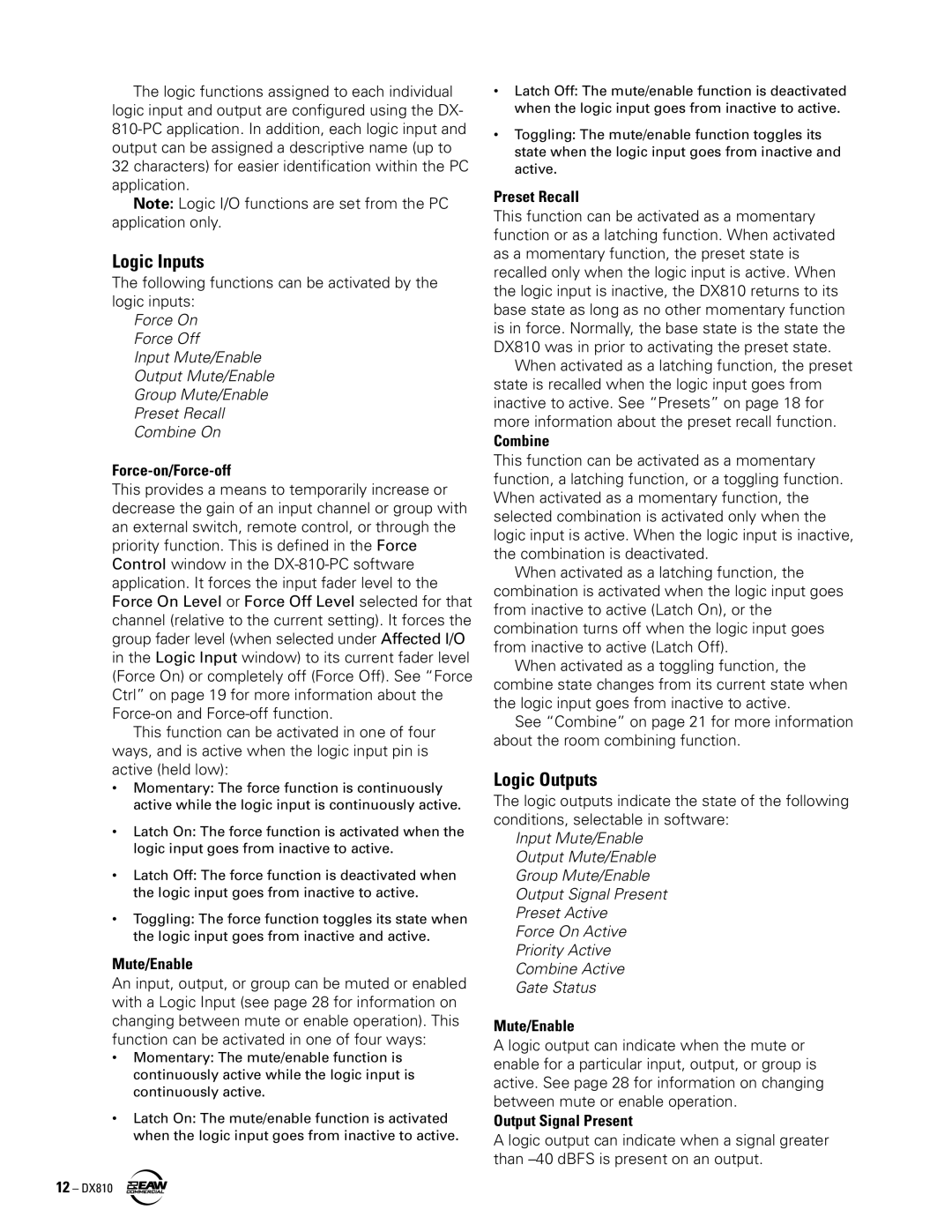The logic functions assigned to each individual logic input and output are configured using the DX-
Note: Logic I/O functions are set from the PC application only.
Logic Inputs
The following functions can be activated by the logic inputs:
Force On
Force Off
Input Mute/Enable
Output Mute/Enable
Group Mute/Enable
Preset Recall
Combine On
Force-on/Force-off
This provides a means to temporarily increase or decrease the gain of an input channel or group with an external switch, remote control, or through the priority function. This is defined in the Force Control window in the
This function can be activated in one of four ways, and is active when the logic input pin is active (held low):
•Momentary: The force function is continuously active while the logic input is continuously active.
•Latch On: The force function is activated when the logic input goes from inactive to active.
•Latch Off: The force function is deactivated when the logic input goes from inactive to active.
•Toggling: The force function toggles its state when the logic input goes from inactive and active.
Mute/Enable
An input, output, or group can be muted or enabled with a Logic Input (see page 28 for information on changing between mute or enable operation). This function can be activated in one of four ways:
•Momentary: The mute/enable function is continuously active while the logic input is continuously active.
•Latch On: The mute/enable function is activated when the logic input goes from inactive to active.
12 – DX810
•Latch Off: The mute/enable function is deactivated when the logic input goes from inactive to active.
•Toggling: The mute/enable function toggles its state when the logic input goes from inactive and active.
Preset Recall
This function can be activated as a momentary function or as a latching function. When activated as a momentary function, the preset state is recalled only when the logic input is active. When the logic input is inactive, the DX810 returns to its base state as long as no other momentary function is in force. Normally, the base state is the state the DX810 was in prior to activating the preset state.
When activated as a latching function, the preset state is recalled when the logic input goes from inactive to active. See “Presets” on page 18 for more information about the preset recall function.
Combine
This function can be activated as a momentary function, a latching function, or a toggling function. When activated as a momentary function, the selected combination is activated only when the logic input is active. When the logic input is inactive, the combination is deactivated.
When activated as a latching function, the combination is activated when the logic input goes from inactive to active (Latch On), or the combination turns off when the logic input goes from inactive to active (Latch Off).
When activated as a toggling function, the combine state changes from its current state when the logic input goes from inactive to active.
See “Combine” on page 21 for more information about the room combining function.
Logic Outputs
The logic outputs indicate the state of the following conditions, selectable in software:
Input Mute/Enable
Output Mute/Enable
Group Mute/Enable
Output Signal Present
Preset Active
Force On Active
Priority Active
Combine Active
Gate Status
Mute/Enable
A logic output can indicate when the mute or enable for a particular input, output, or group is active. See page 28 for information on changing between mute or enable operation.
Output Signal Present
A logic output can indicate when a signal greater than
